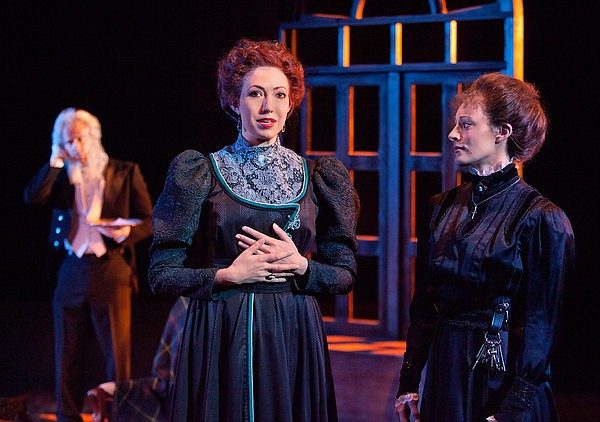- November 23, 2024
-
-
Loading

Loading

Anton Chekhov’s “The Cherry Orchard” is currently on the auction block in an Asolo Conservatory production directed by Andrei Malaev-Babel. There’s a fire sale quality to the play, a sense that everything must go. You feel the urgency. To make matters worse, most of the characters on stage don’t.
The situation? The year is 1904. A family of pampered Russian aristocrats has fallen behind on the mortgage to their estate with its beloved cherry orchard. The now-wealthy grandson of serfs buys it. They’re forced to get real jobs.
That’s really all there is to it. And, of course, it’s not. The characters like to talk — and their endless chatter creates a movie of the mind — or more like a mini-series spanning decades. Vivid scenes of one child’s beating; another child’s drowning; a guilty mother losing herself in the demi-monde of Paris. It’s a montage in the mind’s eye, all through the power of words.
On the other hand, talk is cheap, as the playwright constantly reminds us. Characters talk but rarely listen. Leonid Gayev (Jordan Sobel), is fond of making speeches; if his family won’t lend their ears, a bookcase will do. Yermolai Lopakhin (Joe Knispel), the ex-peasant who made it big, repeatedly advises Lyubov Ranevskaya (Lisa Woods), the matriarch who owns the estate, that the foreclosure auction is coming and subdividing her property is the only way to save a portion. She refuses to hear him. But Lopakhin has his own deafness. The whole world knows he’s destined to marry Anya (Ally Farzetta), the matriarch’s biological daughter. (She might as well hold up a sign: I LOVE YOU! MARRY ME!) But he’s too distracted by money-making schemes to get the message. Adopted daughter Varya (Kim Stephenson) has the closest grasp of the reality principle. She has to — she runs the estate. Varya knows what it’ll take to save it. (Nobody listens to her either.) Perpetual student (and perpetual virgin) Petya Trofimov (Chris Alexey Diaz) gushes with lyrical odes to the glorious future just ahead—the kind of utopian nonsense that got the whole country in a lot of trouble a few years later. The estate’s accident-prone clerk, Semyon Yepikhodov (Evan Reynolds White) is equally clumsy with words and furniture. The 87-year-old butler Firs (Mark Comer) is literally deaf and mourns the freeing of the serfs. Everybody assumes somebody else took him to the nursing home when it’s time to leave and board the place up.
It takes a vast cast of the conservatory’s second-year students bring these mis-communicators to life. (Kudos also to Josh James, Tom Harney, Kevin Barber, Kelsey Petersen, Wyatt McNeil and Scott Kuiper.) There’s a range of acting styles, but I think that’s deliberate. Everybody’s in their own play. Nobody really connects.
The characters are lost in their own subjective realities. Becki Stafford’s costumes, Chris McVicker’s set and lighting design, Eliza Ladd’s movement coaching and Greg Zane’s sound design anchor us in the objective reality they’ve wandered away from. Nice job on the haunting sound effect Chekhov calls for. The cherry orchard in the projection screen should make me go “Wow!” and not “Eh.” (Try harder, OK? That’s what’s at stake.) A minor point. Some productions of “The Cherry Orchard” make you feel like you’re watching the cherry trees grow. Not this one. It’s a fast-paced, snappy production and a great evening of theater. Chekhov’s vision of people who lack vision comes through loud and clear.
Malaev-Babel is a visionary director — but always in the service of the playwright’s original vision. If the story calls for it, his realizations can be surreal, otherworldly and dreamlike. If not, he doesn’t tart it up for effect. Here, he plays it straight, honoring the naturalistic essence of the text (in Paul Schmidt’s excellent contemporary translation). He honors the mordant comedy, too.
Yes, “The Cherry Orchard” is a tragedy. But it’s also packed with Chekhov’s unique gallows humor. For Chekhov, black comedy was a survival skill. Along with being a playwright, he was also a doctor. When you make a diagnosis and the patient won’t take the prescription, what can you do but laugh?
The characters of this play need a strong dose of reality. But they refuse to take their medicine. Their avoidable fate becomes inevitable.
What can you do but laugh?